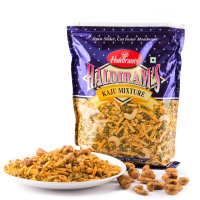Indian Snacks Regularly Fail U.S. FDA Tests
 The FDA found some of Haldiram's salty mixes contained pesticides (photo: JustHomeDelivery)
The FDA found some of Haldiram's salty mixes contained pesticides (photo: JustHomeDelivery)
The ban on Maggi instant noodles due to allegedly high levels of lead may have woken consumers up to the poor safety standards of processed food in India. But according to a Wall Street Journal report, U.S. food-safety inspectors have already rejected hundreds of made-in-India snacks as unfit for sale in America.
Data on the website of the U.S. Food and Drug Administration show that it rejected more snack imports from India than from any other country in the first five months of 2015. Indian products took top position last year as well.
WSJ found that Mexico, a much larger trading partner of the U.S., was second in terms of rejections this year, followed by South Korea. In fact, more than half of all the snack products that failed the test and were then blocked from sale in the U.S. this year were from India.
Indian snacks fail the U.S. FDA tests due to problems in packaging and labelling to alleged contamination. The FDA website says that Indian products contain high levels of pesticides, mould and the bacteria salmonella.
The FDA even found one product from Gujarat to be “a filthy, putrid, or decomposed substance or be otherwise unfit for food.”
India’s Food Safety and Standards Authority does not monitor exports, but after the Maggi findings the national food-safety watchdog has rushed to test everything from soups to pastas to instant noodles. Its chief says he doesn’t have the manpower or facilities to check the millions of packaged products available in kitchens across India.
“Food-safety is a very sensitive thing in developed countries,” so countries like the U.S. have better food-safety infrastructure, said Yudhvir Singh Malik, the chief executive of the authority. “A lot of that sense is still to come in developing countries.”
Most Indian snacks rejected by the FDA this year were from the Nagpur-based food company Haldiram’s – these include some sugar candies and salty snack mixes. The FDA said on its website that it rejected the Haldiram’s products because it found pesticides in them.
In response, A.K. Tyagi, a senior-vice president at Haldiram’s, told WSJ that its food “is 100% safe and complies with the law of the land.” Discrepancies, he said, arise because food-safety standards differ in India and the U.S. “A pesticide that is permitted in India may not be allowed there. And even if it is, they may not allow it in the same concentration as it is here,” he said.
Indian baked snacks also had trouble getting into the U.S. Out of 217 imported baked products rejected by the FDA so far this year, more than half were made in India.
One of these was a biscuit pack manufactured by India’s largest biscuit-maker, Britannia Industries Ltd. The FDA pointed out on its website that the packaging of this product didn’t list all the ingredients and also failed to provide consumers adequate nutrition information.
Britannia, in response, said it didn’t authorize the shipment.
“Britannia exports to the U.S. only out of U.S. FDA registered factories in India and meets product/labeling standards,” the company said in an email. “These may be instances of shipments made by independent exporters based out of India.”
- Karan Singh
To Learn More:
Before the Maggi Noodles Scare: Look at What the U.S. FDA Found in Indian Snacks (by Preetika Rana, Wall Street Journal)
2,100 batches of Indian goods including those made by HUL, Britannia, Nestle, Haldiram fail to gain entry in US (by Writankar Mukherjee and Sagar Malviya, Economic Times)
Haldiram's leads Indian snack market; surpasses combined sales of McDonald’s and Domino’s (by Sagar Malviya, Economic Times)
- Top Stories
- Controversies
- Where is the Money Going?
- India and the World
- Appointments and Resignations
- Unusual News
- Latest News
- India College Chain’s Expansion into U.S. Draws Opposition from Massachusetts Officials over Quality of Education
- Milk Shortages in India Tied to Release of New Movies Featuring Nation’s Favorite Stars
- Confusion Swirls around Kashmir Newspaper Ban in Wake of Violent Street Protests
- Polio-Free for 5 Years, India Launches Vaccine Drive after Polio Strain Discovery
- New Aviation Policy Could Increase Service, Lower Ticket Prices






Comments